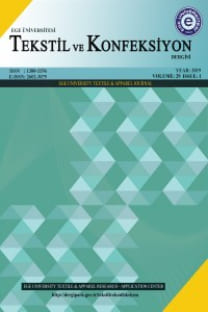FARKLI TİPTE POLYESTER İPLİKLERLE ÜRETİLMİŞ PERDELİK KUMAŞLARIN PERFORMANS ÖZELLİKLERİNİN ARAŞTIRILMASI
Perde, polyester, hava geçirgenliği, aşınma dayanımı, kopma dayanımı
AN INVESTIGATION OF PERFORMANCE PROPERTIES OF CURTAIN FABRICS PRODUCED WITH DIFFERENT TYPES OF POLYESTER YARNS
Curtain, polyester, air permeability, abrasion resistance, breaking strength,
___
- 1. Azeem A., Jahandad N.,Sharjeal A., Ahsan Z., Abdullah S., Bilal R., 2015, “Modeling and Optimization of Performance Properties of Drapery Fabrics Made by Cotton”, International Journal of Textile Science, 4(3), pp:60-65.
- 2. Çeven E.K., Süle G., Gürarda A., Ersöz A., 2011, “Investigation of the Air Permeability Property of Fabrics Woven with Metallic Yarns” Journal of Uludag University Engineering and Architecture Faculty, 16(2), pp: 65-74.
- 3. ASTM D3691/D3691M-09 “Standard Performance Specification for Woven, Lace and Knit Household Curtain and Drapery Fabrics”
- 4. Shahba F.A., 2008, “Production and Characterization of Novel Perfumed Curtain Fabrics”, RJTA, 12(4), pp. 31-40.
- 5. Home Furnishings- A Review. (2016, January 15). Retrieved from http://www.teonline.com/knowledge-centre/home-furnishing.html
- 6. Aydemir H., Demiryürek O., 2014, “Investigation of Breaking Strength, Air Permeability and Water Repellent Properties of Roller Blind Fabrics”, Journal of Erciyes University Science Instıtute, 30(4), pp: 240-247.
- 7. Tayyar A.E., 2010, “Effects of Fabric Parameters on Bursting Strength of Home Textiles”, Journal of Pamukkale University Engineering Faculty, 16(2), pp:165-172.
- 8. İbrahim S.O.K., 2012. “The Effect of Materials Kind Variation on the Functional Performance of the Woven Curtains”, Journal of American Science,8(4),pp:417-425.
- 9. Altaş S., Kadoğlu H., 2009, “The Influence of Some Spinning Parameters on Strength Properties of Core Filament Dref-3 Yarns”, Tekstil ve Konfeksiyon,19(2), pp:93-96.
- 10. Kumpikaitė E., Ragaišienė A., Barburski M., 2010, “Comparable Analysis of the End-Use Properties of Woven Fabrics with Fancy Yarns. Part I: Abrasion Resistance and Air Permeability”, Fibres & Textiles in Eastern Europe, 18 (3), pp.56-59.
- 11. Fan J.,Hunter L., 2009, “Engineering Apparel Fabrics and Garments”, The Textile Institute, pp.170-171.
- 12. Kothari V. K., Timble N. B., 1991, “Air-Jet Texturing: Effect of Jet Type and Some Process Parameters on Properties of Air-Jet Textured Yarns”, Indian Journal of Fibre & Textile Research, 16, pp. 29-38.
- ISSN: 1300-3356
- Yayın Aralığı: Yılda 4 Sayı
- Yayıncı: Ege Üniversitesi Tekstil ve Konfeksiyon Araştırma & Uygulama Merkezi
CUPRO VE DİĞER BAZI REJENERE SELÜLOZ LİFLERİNDEN ÜRETİLEN KUMAŞLARIN PERFORMANS ÖZELLİKLERİ
ÇÖZGÜLÜ ÖRME RAŞEL KUMAŞLARIN AŞINMA DAYANIMI VE PATLAMA MUKAVEMETİNİN İNCELENMESİ
Mehmet TİRİTOĞLU, Yasemin KAVUŞTURAN
TRANS-PASİFİK ORTAKLIĞININ TÜRKİYE'NİN TEKSTİL VE KONFEKSİYON İHRACATINA OLASI ETKİSİ
Gnanapriya K, Jeyakodi Moses J
İ. Hakan KARACIZMELI, S. Noyan OGULATA
K GNANAPRİYA, Jeyakodi MOSES J
Derya TAMA, Berna CÜREKLIBATIR ENCAN, Ziynet ÖNDOĞAN
Zouhaier ROMDHANI, Ayda BAFFOUN, Mohamed HAMDAOUI, Sadok ROUDESLI
T POLİMETİLMETAKRİLAT/N-ALKANMİKROKAPSÜLLERİN TERMAL ÖZELLİKLERİNE HİDROFİLİK KOMONOMERİN ETKİSİ
Ruhan ALTUN ANAYURT, Cemil ALKAN, Sennur ALAY AKSOY, Sena DEMİRBAĞ, Müyesser Selda TÖZÜM
AYAKKABI YÜZLÜK DERİLERİNİN BAZI FİZİKSEL KARAKTERİSTİKLERİ ÜZERINE FINISAJ TEKNİKLERİNİN ETKİLERİ
Arife Candaş ADIGÜZEL ZENGİN, Nida OĞLAKCIOĞLU, Behzat Oral BİTLİSLİ
